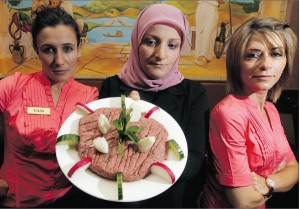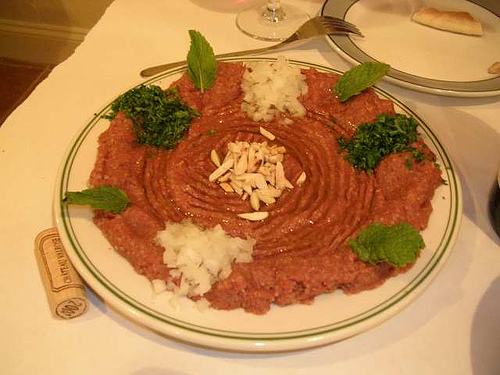A month after an Ontario health unit decided to enforce a ban on kibbeh – a Lebanese dish made from raw hamburger – one restaurant says it will serve the dish processed instead of ground, sidestepping regulations.
Mazaar restaurant co-owner Imad Najjar told the Windsor Star, "I’m going to serve it until a food processor or a mincer is called a grinder."
Dr. Allen Heimann, Windsor-Essex County chief medical officer, responded, "If meat is sliced thinly while raw, like ceviche, which is Italian, it is not in violation of the regulations. But if it is  raw ground meat, then that’s something entirely different."
raw ground meat, then that’s something entirely different."
The latest statements cap weeks of uncertainty, bungling and bad food safety advice.
It began in late June when Windsor-Essex County Health Unit inspectors began forcing Lebanese restaurants to pull product after a report of contaminated raw kibbeh in Ottawa late last year.
Provincial regulations require ground meat cooked to an internal temperature of at least 71 C for at least 15 seconds.
Medical officer Heimann then went on the record to state, “regardless of the popularity of a product, public safety must be my priority.
“Raw kibbeh and steak tartare are raw ground meat dishes that do not conform to section 33(7) paragraph 3 of Ontario Regulation 562, of The Food Premises Regulation.
“This section of the regulation states that all parts of ground meat (other than ground meat containing poultry) must be cooked to reach an internal temperature of at least 71 C for at least 15 seconds. Ground meat containing poultry must be cooked to at least 74 C for at least 15 seconds.
“On July 10, a teleconference was held to discuss the issue with the Ministry of Health and Long-Term Care and several other health units, including Ottawa, Toronto and London.
“All of the participating health units confirmed they do not allow the serving of raw ground meat in restaurants. The teleconference group further agreed to continue to review this issue in accordance with the Food Premises Regulation.”
And then things got really confusing.
An Ottawa resident wrote, “The regulation Heimann keeps quoting, that ground meat should be cooked to 71 C, deals with store-bought ground meat that was never intended and should not be used for raw consumption. Kibbeh, tartare and carpaccio do not fall into this category, as any foodie (or 15 seconds on Google) could tell you.”
Raw is raw.
A local medical doctor wrote that he’s never seen a case of E. coli from kibbeh, and that, “if you really wanted to prevent this infection in our community, perhaps Big Brother should ban travel to Mexico.”
It didn’t take long for a raw milk proponent to jump in and argue freedom of choice should apply to all foods.
Maybe. But don’t serve it to kids. The Ontario government needs to come clean on what the rules are and how they should be enforced without leaving local inspectors as the arbiters for bureaucratic indecision.
 reported from Wisconsin since the last update.
reported from Wisconsin since the last update.




 raw ground meat, then that’s something entirely different."
raw ground meat, then that’s something entirely different.".jpg) Apparently it does.
Apparently it does.
 "They didn’t send us any letters."
"They didn’t send us any letters."